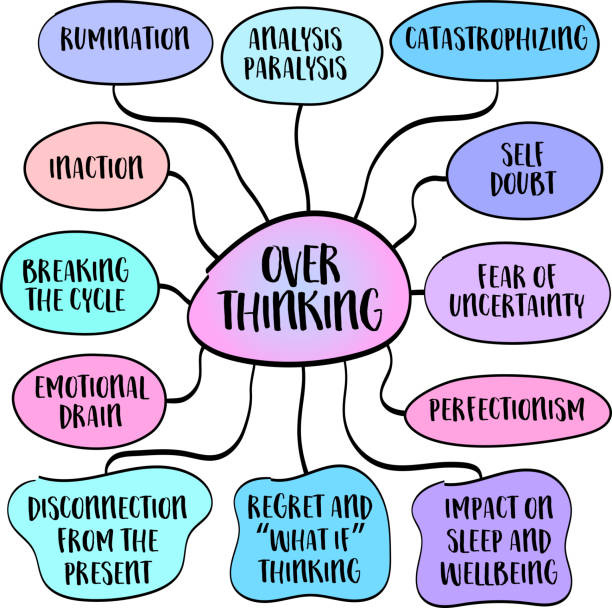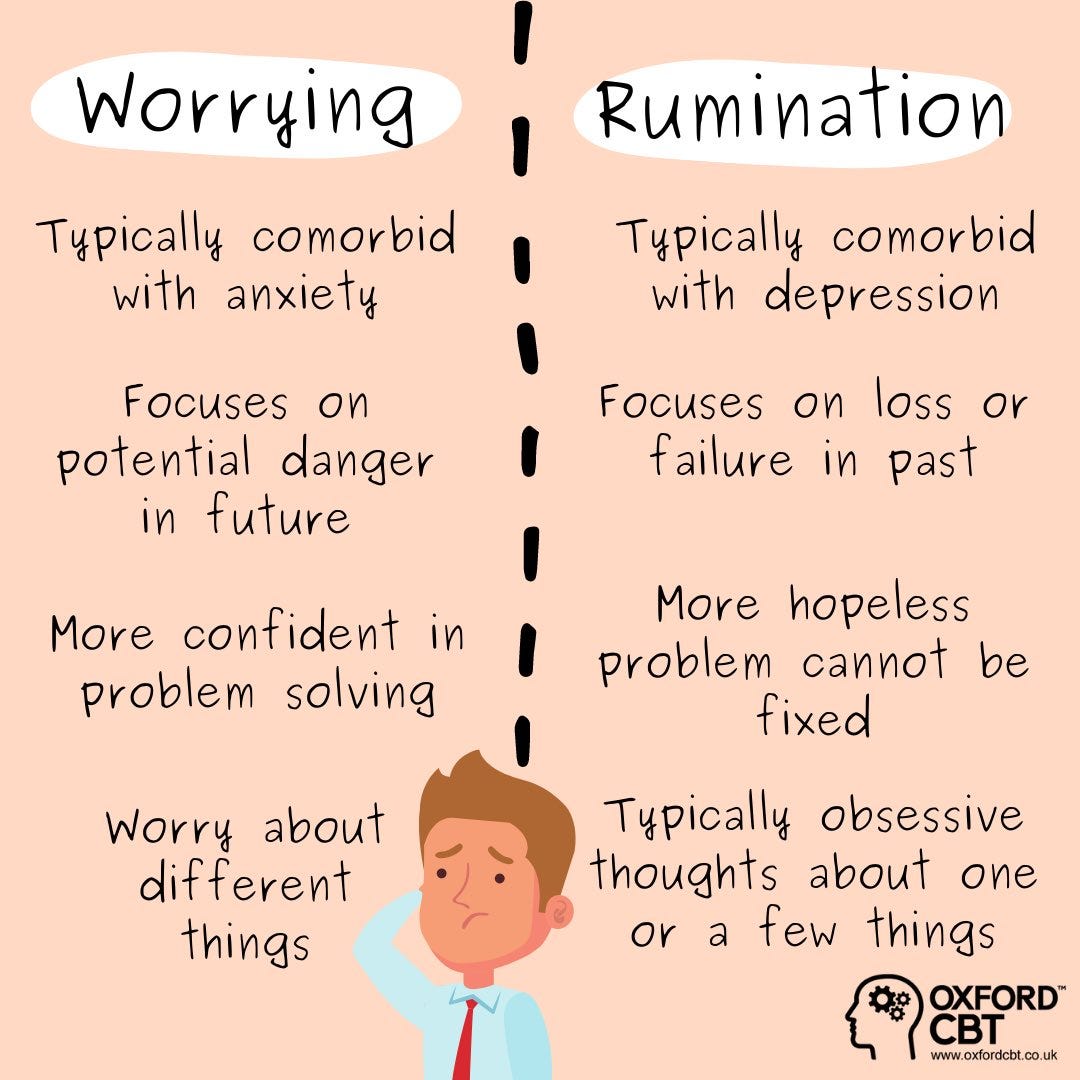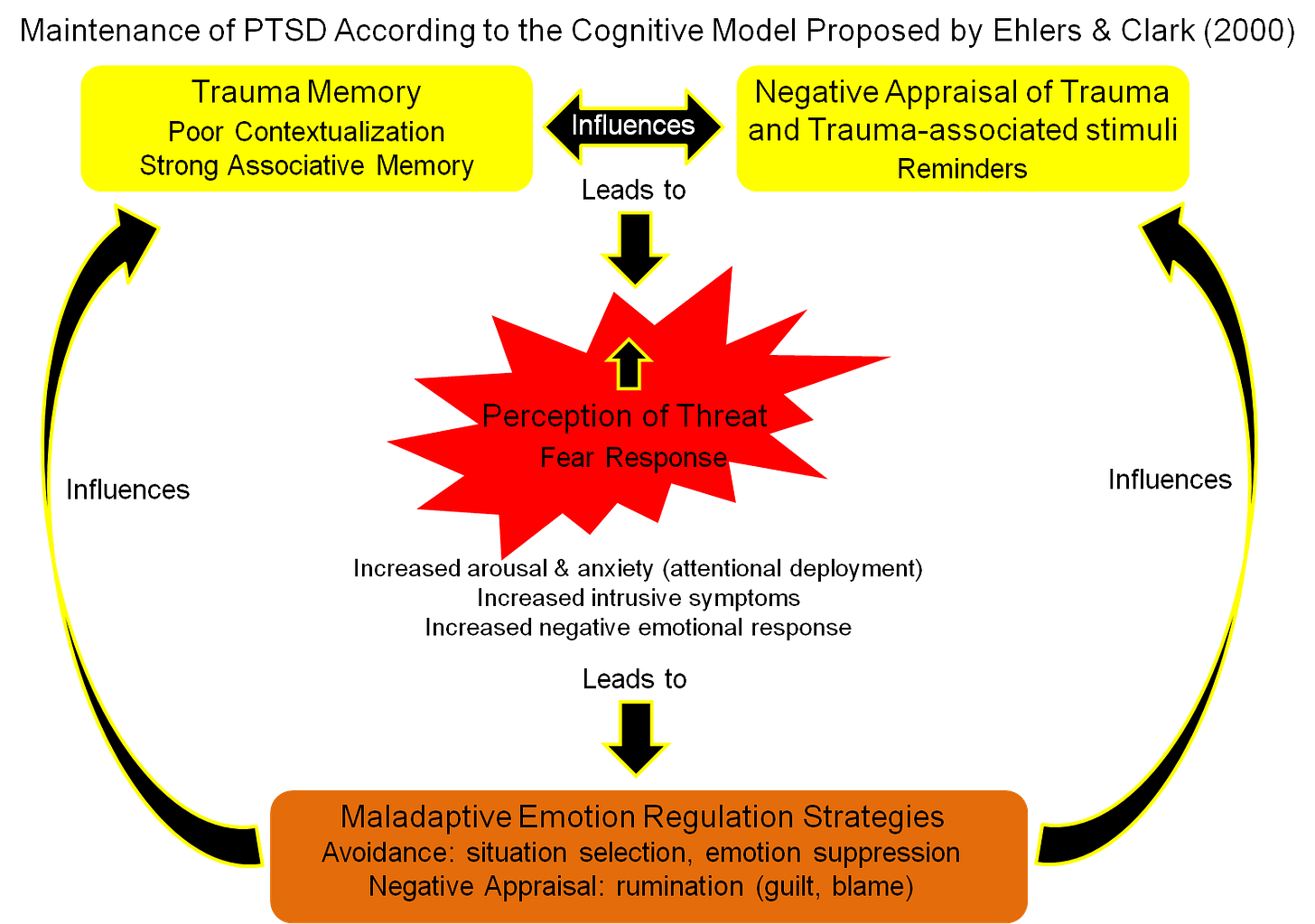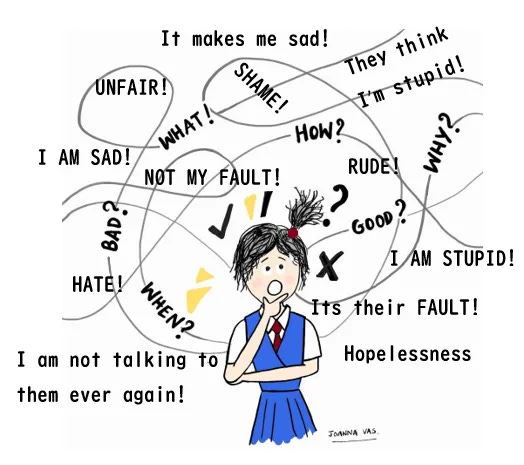A theme in psychotherapy is recurring thoughts that won’t go away.
“I wish I had never done…” OR “Why did I do…”
We ruminate over loss or unfulfilled wishes, trivial matters—lost keys or missing articles of clothing, something unfortunate said in passing, substantial mishaps, and “unfinished" tasks.
We ruminate when we feel misunderstood or damaged.
I can’t stop worrying about my health…
My lab results indicate that my cholesterol is high. I can’t stop feeling guilty about my bad eating habits…
I can’t stop thinking about what I said yesterday that might have offended my best friend…
I tossed and turned all night thinking about what my ex did to me, …I wish he would die…
I can’t stop worrying about what happened to me yesterday. I can’t get it out of my mind…
Rumination is an inherent part of our human thought processes.
Thoughts, impulses, and disturbing feelings push into our awareness.
Intense rumination is a symptom of mental illness.
Anxious people ruminate. People with chronic depression ruminate.
Anxious people who ruminate are “worried.”
People with schizophrenia ruminate.
Paranoia is rumination with a negative/fear bias.
Sometimes we ruminate for no reason.
At times, the reason may be traumatic.
What is rumination?
Why do I ruminate?
How can I stop ruminating?
I address these questions in this entry.
What is rumination?
The Merriam-Webster dictionary defines “mental” rumination as: b: …obsessive thinking about an idea, situation, or choice, especially when it interferes with normal mental functioning
The American Psychological Association elaborates: 1. (n) …obsessional thinking involving excessive, repetitive thoughts or themes that interfere with other forms of mental activity. It is a common feature of obsessive-compulsive disorder and generalized anxiety disorder.
The American Psychiatric Association has coined the acronym NSRP (Negative self-Referential Processing), where “rumination” is core.
NSRP fits the pattern in “the worried well” or is a feature of “transdiagnostics,” which are problematic complaints of two or more typical diagnoses (anxiety and depression). These prompt rumination; therefore, ruminating is transdiagnostic.
Distilled from these definitions, rumination is: “a way of thinking which is”
Obsessive
Repetitive
Pressured
Interfering
It can be helpful to know what rumination is NOT.
Rumination is NOT Obsessive Compulsive Disorder (OCD), although a symptom of OCD is rumination.
Rumination is NOT anxiety or depression, but it contributes to the psychic pain from these disorders.
Rumination is unendingly repeating thoughts.
When was the last time you ruminated?
Why do I ruminate?
Biological Reasons
Neural activation precedes rumination. Ruminative impulses originate in the medial prefrontal cortex (mPFC), where narrative and autobiographical self-memory are stored. The impulse moves to the posterior cingulate cortex (PCC), which is associated with experiential and non-judgmental self-reflection. The impulse energy comes from the amygdala.
This is called the Default Mode Network (DMN) or Task-Negative Network (TNN) process.
DMN is normative and occurs in a resting, yet awake, brain state when individuals are undisturbed or allowed to self-reflect.
The picture above is the activated brain region (blue is brain activation) during rumination.
Psychological Reasons We Ruminate:
“STRESS”
Traumatic events that are strong enough to undermine self-regulation tend to stimulate rumination.
Chronic Low-Grade Stress that builds to trauma-stress can produce rumination.
Conflict generates internal stress, and internal stress, in turn, fuels rumination.
Conflict is a discrepancy between a goal and a desire.
EXAMPLE: You unexpectedly receive a low grade on your test. This test is required to pass your class. The non-passing test grade creates a discrepancy between passing and failing the class.
The discrepancy is between what you “expected and how you performed.”
Suppose you knew that failing this test was likely to happen. You expect to fail; therefore, you would be unlikely to ruminate about it.
If you knew that passing or failing the test was unrelated to passing the class, you would be unlikely to ruminate about the test or its aftermath.
These are the keys to understanding the implications of RUMINATION.
Rumination is a style of thought rather than just negative thought content.
For example, you could win the lottery and still ruminate about the money you won! You would repeatedly think about the money, feeling both fearful and enthusiastic. Within the pressure of opposite feelings, you would experience conflict. Although you are a lucky winner, this conflict could stimulate rumination.
Even as a lucky lotto winner, conflicted (positive and negative) thoughts cycle because, although you have just won a boat-load of money, your conflicted thinking causes you to start ruminating, and the rumination makes you miserable.
A Rumination Example
John is getting married, everyone is happy, plans are made, and money is being spent.
Everything is excellent, and John is happy. However, as the marriage date nears, John starts to think about all the other women he has dated over the years. He begins to feel conflict, which engenders rumination.
John starts recalling the names and addresses of many of these women. As he does, his conflict builds. John now wants relief from these cycling thoughts; he can’t stop thinking about (and imagining) all these women. He reasons that sending emails to these women (some he barely knows) will diminish his rumination.
Some of these women (who know John is getting married soon) wonder what John is doing and if John is OK. They don’t respond. An old fling responds to John’s email.
John now can’t stop thinking about her, and his rumination around her intensifies. Although she is married, John thinks he might be in love with this woman. John decides that the only way to stop his rumination is to go out with this girl and tell her, once and for all, that he is getting married.
John goes on a single date with this girl and has sex—or a one-night stand—with her afterwards.
John is no longer ruminating about all the women he’s dated. Instead, he starts ruminating, more intensely this time, because he feels guilty and believes he has a dirty secret that will cause his marriage, if he gets married at all, to fail.
In the fever and press of rumination, John calls off the wedding. Everyone asks, “Why?” because John and Mary seemed to be a very happy and contented couple.
John makes an appointment to see me. He says his presenting problem is NOT rumination but guilt. How would you diagnose John?
Your context of living can impact rumination. For example, if you live in a rural (wooded) area, the likelihood of rumination is lower than in an urban area. PNAS, June 29, 2015: https://www.pnas.org/doi/10.1073/pnas.1510459112
Philosophical Reasons We Ruminate
Rumination initially serves as adaptive preparation for dealing with a conflict or problem, but then it goes awry.
If you have a problem, reflecting on it and considering your options is a wise approach. This is primarily before you act. Sometimes, problems are insoluble, so you eventually learn to find a way to live with the problem, particularly if it won’t go away.
Rumination takes the first method (reflection) too far. Rumination views the second method (letting go, living with) as intolerable. To the ruminator: All problems must be solved (now), and as the rumination intensifies, the solutions can become maladaptive and even problematic in their own right.
Mental Rumination is maladaptive in almost all circumstances.
Complex philosophical or cognitive problems are never solved without reflection and eventually learning to “think outside the box.”
I provide a visual example to highlight insight problem-solving.
When ruminating, the solution to the above problem would be difficult, if not impossible. Why?
If you want to solve it quickly, you will try obvious ways, but you will remain within what you believe is the prescribed matrix, although this is not stated in the instructions. This is rigid thinking.
A pattern of rigid trying will increase in frequency and intensity. Your frustration will build (conflict will emerge - you expected to solve it easily with effort, but the problem doesn’t lend itself to this).
You would not be able to stop your repetitive thought process and you would get increasingly frustrated until you eventually walked away.
However, you would continue to think about the problem one-dimensionally, and it would press on you, increasing the conflict.
To the ruminator, the lack of a found solution would be a loose-end conflict. You believed that to diminish your ruminating thoughts, you would seek strategies to escape your redundant one-dimensional thinking process.
Why?
Ruminating blocks insight by narrowing focus and preventing “out-of-the-box” thinking.
Ruminating is always narrow and pressured—the antithesis of reflective and flexible.
A ruminative mindset is characterized as anxious, narrow, intense, and time-pressured, whereas a reflective mindset is contemplative, open, curious, and unpressured.
Ruminative Thought Style Questionnaire
McMurrich SL, Johnson SL. Dispositional Rumination in Individuals with a Depression History. Cognit Ther Res. 2008;32(4):542. doi: 10.1007/s10608-006-9093-y. PMID: 20126425; PMCID: PMC2814435
Instructions: Read each item and indicate (by circling the number) the extent to which the statement applies to you.
I find that my mind goes over things again and again.
1 = almost never
2 = rarely
3 = sometimes
4 = almost always
When I have a problem, it will gnaw on my mind for a long time.
1 = almost never
2 = rarely
3 = sometimes
4 = almost always
I find that some thoughts come to my mind over and over throughout the day.
1 = almost never
2 = rarely
3 = sometimes
4 = almost always
I can’t stop thinking about some things.
1 = almost never
2 = rarely
3 = sometimes
4 = almost always
When I am expecting to meet someone, I will imagine every possible scenario and conversation.
1 = almost never
2 = rarely
3 = sometimes
4 = almost always
I tend to replay past events as I would have liked them to happen.
1 = almost never
2 = rarely
3 = sometimes
4 = almost always
I find myself daydreaming about things I wish I had done.
1 = almost never
2 = rarely
3 = sometimes
4 = almost always
When I feel I have had a bad interaction with someone, I tend to imagine various scenarios where I would have acted differently.
1 = almost never
2 = rarely
3 = sometimes
4 = almost always
When trying to solve a complicated problem, I find that I just keep coming back to the beginning without ever finding a solution.
1 = almost never
2 = rarely
3 = sometimes
4 = almost always
If there is an important event coming up, I think about it so much that I work myself up.
1 = almost never
2 = rarely
3 = sometimes
4 = almost always
I have never been able to distract myself from unwanted thoughts.
1 = almost never
2 = rarely
3 = sometimes
4 = almost always
Even if I think about a problem for hours, I still have a hard time coming to a clear understanding.
1 = almost never
2 = rarely
3 = sometimes
4 = almost always
It is very difficult for me to come to a clear conclusion about some problems, no matter how much I think about it.
1 = almost never
2 = rarely
3 = sometimes
4 = almost always
Sometimes I realize I have been sitting and thinking about something for hours.
1 = almost never
2 = rarely
3 = sometimes
4 = almost always
When I am trying to work out a problem, it is like I have a long debate in my mind where I keep going over different points.
1 = almost never
2 = rarely
3 = sometimes
4 = almost always
When I am looking forward to an exciting event, thoughts of it interfere with what I am working on.
1 = almost never
2 = rarely
3 = sometimes
4 = almost always
Sometimes even during a conversation, I find unrelated thoughts popping into my head.
1 = almost never
2 = rarely
3 = sometimes
4 = almost always
When I have an important conversation coming up, I tend to go over it in my mind again and again.
1 = almost never
2 = rarely
3 = sometimes
4 = almost always
If I have an important event coming up, I can’t stop thinking about it.
1 = almost never
2 = rarely
3 = sometimes
4 = Sum your responses across the 19 items to obtain a total score. Your score will be between 19 and 76.
SCORING: ADD THE NUMBERS AND GET A SUM. IF YOUR SCORE IS ABOVE 55, YOUR LIFESTYLE IS IMPACTED BY RUMINATION.
Data: Below is a distribution of the RRS Questionnaire (22-item version). This would be similar to the 19-item version.
This study was used to identify a “cut-off” score for the 22-item version. https://doi.org/10.1016/j.actpsy.2024.104331 Adjusting mathematically for the 19-item version would yield a score between 53 and 55, which is high rumination and associated with depression and/or anxiety. If you score over 55 on the 19-item version, your rumination behavior would be considered “problematic.”
Another study, examining 1,201 adolescents between 10 and 17 years, found that women reported higher average scores on this instrument than men.
Jose, P. E., et al. (2008). Journal of Youth and Adolescence, Volume 37, pages 180–192.
Managing Rumination
What can a person do to manage ruminative tendencies? Many approaches have been developed. I present a few below:
Distract yourself with activities that interrupt ruminative thinking, such as shifting to positive memories, long enough to break the rumination cycle.
Try to recall situations when things worked out during challenges.
Enlist the help of family or friends in recalling past positive experiences, such as times when things turned out well. This can help temporarily shift your ruminative pattern.
Engage in physical activity at the point of rumination. Physical exercise can act as a distraction, but it also mobilizes your physiology through unrelated activity, frequently breaking a ruminative pattern.
Try to separate problems into smaller steps or break down larger problems into smaller issues. Tackle one issue at a time.
Write down the issue, including its components. This will slow your repetitive mental processing.






















